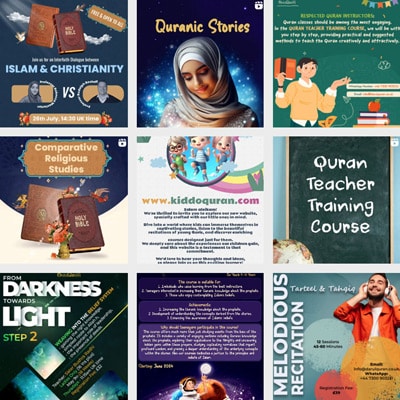A servant would not perfect the reality of faith at all except that he has three qualities: reflecting about religion, well planning in life, being patient with calamities.
Ali ibn Musa al-Rida
Table of Contents
ToggleImportance of Teaching the Holy Quran to Children
Teaching the Sacred Quran to children holds immense significance in Islamic societies.
Quran, being the holy book of Islam, is considered the word of Allah and holds spiritual, moral, and ethical guidance for Muslims worldwide.
This essay aims to explore the historical context, key figures, and the impact of teaching the Grand Quran to children. It will also identify and analyze influential individuals who have contributed to the field.
Additionally, this essay will discuss various perspectives, both positive and negative, and provide a well-reasoned analysis.
Furthermore, possible future developments related to the importance of teaching the Glorious Quran to children will be considered.
Teaching the Noble Quran to children has deep roots in Islamic history.
The revelation of the Holy Quran to the Prophet Muhammad in the 7th century played a pivotal role in shaping the teachings of Islam. Muhammad, as the chief advocate of Islam, emphasized the transmission of Quranic knowledge to new generations.
His ultimate aim was to ensure that Islam would thrive beyond his lifetime, and teaching the Glorious Quran to children was seen as a fundamental aspect of achieving this goal.
One of the key figures in this historical context is Imam Abu Hanifa, who established the Hanafi school of thought.
Abu Hanifa emphasized teaching the Noble Quran to children from an early age.
He believed that instilling Quranic knowledge in young minds would foster a deep understanding of Islamic principles and morality.
His contributions to the field of Quranic education laid the foundation for subsequent scholars and thinkers to emphasize its importance.
Another significant historical figure is Imam Al-Ghazali, whose thoughts and writings greatly influenced the teaching of the Sacred Quran to children.
Al-Ghazali emphasized the crucial role of education in shaping the character and understanding of individuals.
He believed that teaching the Grand Quran to children would build a strong moral compass and spiritual foundation, leading to righteous behavior and ethical conduct.
His ideas continue to inspire scholars and educators to prioritize Quranic education for children.
The impact of teaching the Noble Quran to children cannot be overstated. It shapes the religious, moral, and cultural identity of young Muslims.
By instilling Quranic values, children develop a deep understanding of Islamic teachings, which helps them navigate various aspects of life.
One influential figure in the field of Quranic education is Dr. Farida Khanam. Through her research, publications, and pedagogical methods, she has revolutionized how children connect with the Quran.
Dr. Khanam’s contributions have made Quranic education more accessible and engaging, catering to different learning styles and age groups. Her efforts have resulted in a significant increase in the number of children engaging with the Holy Quran.
Another prominent individual is Sheikh Ahmed Tijani Ben Omar, who has dedicated his life to promoting Quranic literacy among children.
He established numerous educational institutions focused on Quranic teachings and has trained a generation of educators who specialize in teaching the Quran to children.
His tireless efforts have helped create a culture of Quranic education in many Muslim communities.
From a positive perspective, teaching the Glorious Quran to children equips them with essential spiritual and moral foundations, helping them lead a purposeful and righteous life.
It fosters a sense of belonging to the Muslim community and strengthens their faith. Quranic education also promotes critical thinking, as children engage with the text and apply its teachings to contemporary issues.
However, some may argue that an exclusive focus on Quranic education may limit broader educational opportunities for children.
Balancing secular education with Quranic teachings becomes crucial to ensure children receive a well-rounded education.
Additionally, there is a need for relevant and progressive curriculum development in Quranic education that addresses contemporary challenges faced by children.
The future of teaching the Quran to children is likely to witness advancements in teaching methodologies and technologies.
The integration of digital platforms and interactive learning materials like DarulQuran can enhance engagement and make Quranic education more accessible to children worldwide.
Furthermore, collaborations between scholars, educators, and researchers can lead to the development of comprehensive teaching materials that cater to the diverse needs of children.

Arabic Alphabet and Pronunciation
The Arabic alphabet and pronunciation play a crucial role in teaching the Noble Quran to children.
The historical context of the development of the Arabic alphabet, key figures involved in preserving its pronunciation, and the impact of these elements on Quranic education for children are essential for a comprehensive understanding.
This essay will explore these aspects, analyze influential individuals in this field, discuss different perspectives, and consider potential future developments related to teaching the Noble Quran to children using the Arabic alphabet and pronunciation.
The Arabic alphabet has a rich history that can be traced back to ancient Semitic scripts.
The earliest form of the alphabet can be seen in the Nabatean inscriptions, dating back to the 4th century BCE. Over time, the Arabic script evolved and became more standardized during the 7th century CE, when it was adopted for writing the Holy Quran under the supervision of early Islamic scholars.
One of the key figures who played a vital role in preserving the Arabic alphabet and pronunciation for teaching the Noble Quran was Uthman ibn Affan, the third caliph of Islam.
Uthman realized the importance of maintaining the integrity of the Quranic text and ordered the compilation of a standard text that followed the dialect of the Quraysh tribe, the dialect spoken by the Prophet Muhammad.
This standardized text helped to ensure uniformity in recitation and pronunciation among Muslims.
Another significant figure is Imam Al-Shatibi, a renowned scholar who specialized in the field of Quranic sciences.
He wrote extensively about Tajwid, the science of Quranic recitation.
Imam Al-Shatibi’s contributions to the field of pronunciation and its application in teaching the noble Quran to children cannot be overstated.
His work revolutionized the way Quranic recitation was taught, emphasizing the correct pronunciation and articulation of each letter and sound.
The impact of the Arabic alphabet and pronunciation as the basic foundation for teaching the Noble Quran to children is profound.
Firstly, learning the Arabic alphabet provides children with the essential tools to read and recite the Grand Quran independently.
This empowerment helps them develop a closer relationship with the holy book and instills a sense of pride in their Arabic heritage.
Additionally, the correct pronunciation of the Arabic letters and words is crucial for understanding the Quran’s meaning and message accurately.
Children who learn to pronounce the Arabic alphabet correctly can grasp the linguistic nuances embedded in the heavenly Quran more effectively.
The importance of pronunciation is reflected in the concept of Tajwid, which ensures that every word in the Quran is recited with the correct phonetic attributes, including correct pronunciation, elongation, and stress.
Several influential individuals have made significant contributions to the field of Arabic alphabet and pronunciation for teaching the noble Quran to children.
One such figure is Sheikh Abdul Basit Abdus Samad, an Egyptian Quranic reciter known for his impeccable Tajwid and melodious recitation.
His recordings and recitations have served as influential educational resources for children learning Quranic recitation.
Another influential individual is Dr. Ayman Rushdy Suwayd, an accomplished scholar who has dedicated his life to disseminating the correct pronunciation of the Arabic alphabet and proper Tajwid rules.
Dr. Suwayd has authored numerous books and developed online courses that provide valuable resources for parents and educators seeking to teach the Noble Quran to children.
However, there are challenges associated with this approach as well. Learning a new language and mastering its pronunciation can be demanding for young children.
The Arabic alphabet, with its unique script and sounds, may present initial difficulties for non-native speakers.
To address these challenges, innovative teaching methods and resources are emerging, combining traditional pedagogy with interactive technology to facilitate children’s understanding and retention of the Arabic alphabet and pronunciation.
Looking towards future developments, advancements in technology offer exciting possibilities for teaching the Noble Quran to children.
Mobile applications and e-learning platforms now provide interactive and engaging tools for learning the Arabic alphabet and Quranic recitation.
These resources can supplement traditional teaching methods and make Quranic education more accessible and appealing to children.
Introduce Simple Quranic Verses and Their Meanings
Using simple verses and explaining their meanings allows children to comprehend the essence of these teachings.
It helps them develop a deep connection with Allah and understand His message in a way that is relatable to their young minds.
Moreover, this approach encourages critical thinking skills as they ponder upon the significance of each verse.
Furthermore, introducing the Holy Quran through simple verses fosters love for reading and learning within our children.
They will grow up appreciating the beauty of language and literature while simultaneously gaining knowledge about Islam. This will enable them to navigate through life’s challenges with wisdom derived from the divine words.
Additionally, teaching our children the Glorious Quran at an early age creates a strong foundation for their faith.
It equips them with spiritual tools necessary for making informed decisions throughout their lives.
By understanding these verses’ meanings from childhood, they will be better prepared to face ethical dilemmas and make choices aligned with Islamic principles.
Introducing simple Quranic verses along with their meanings is an effective method of teaching our children about Islam. It not only imparts valuable knowledge but also nurtures their spirituality from an early age.
Let us embrace this approach as responsible parents or guardians to raise righteous individuals who are well-versed in both worldly matters and religious teachings.
Teach the Proper Recitation and Tajwid Rules
Recitation focuses on accurately pronouncing each letter and word in Arabic. It involves learning the correct pronunciation, intonation, and rhythm of the verses.
This method ensures that children can read the Sacred Quran fluently without any mistakes. On the other hand, Tajwid goes beyond mere pronunciation; it emphasizes proper articulation, elongation, and emphasis on specific letters or words.
Tajwid helps children understand the deeper meanings behind each verse by conveying its intended message through precise vocalization.
While both methods have their merits, teaching Tajwid rules alongside recitation provides a more comprehensive understanding of the Quran’s teachings. Recitation alone may lead to mechanical reading without grasping its true essence.
By incorporating Tajwid rules into their learning process, children can develop a profound connection with Allah’s words.
Moreover, teaching both recitation and Tajwid allows children to appreciate the aesthetic beauty of Quranic verses.
The melodious rhythm created by applying Tajwid rules enhances their engagement with divine scripture.
teaching both recitation and Tajwid rules is essential for imparting a deep understanding of the sacred Quran to my children.
While recitation ensures accurate pronunciation, Tajwid adds depth by emphasizing proper articulation and conveying intended meanings effectively.
Together, these approaches enable children to develop a strong connection with Allah’s words while appreciating its aesthetic beauty.

Encourage Memorization of Selected Verses and Chapters
The Holy Quran is not merely a book; it is a divine guide that provides wisdom, guidance, and solace. As a parent, I am responsible for imparting the teachings of the Grand Quran to my children.
While reading and understanding the Grand Quran is essential, encouraging memorisation of selected verses and chapters can deepen their connection with this sacred text.
Memorising verses from the Glorious Quran has been a cherished tradition for centuries.
It allows individuals to internalize its profound messages and carry them in their hearts throughout their lives. By teaching my children to memorize verses, I am instilling in them a love for Allah’s words and fostering spiritual growth.
Moreover, memorisation enhances cognitive abilities such as concentration, discipline, and memory retention. It also strengthens linguistic skills by improving vocabulary and pronunciation.
This practice will not only benefit their religious education but also aid them academically.
Foster a love for the Quran through Storytelling and Reflection
Storytelling is an age-old tradition that has been used to captivate and educate children for centuries.
By using stories to convey the messages and teachings of the Noble Quran, children are able to connect with the text on a more personal and relatable level.
These stories can be adapted from the numerous inspiring incidents and parables found within the Holy Quran.
For example, a story can be told about the Prophet Ibrahim (Abraham) and his unwavering faith in Allah.
Children can learn about how Ibrahim demonstrated his love and trust for Allah by obeying His command to sacrifice his son, Ismail (Ishmael). Through this story, children can grasp the importance of complete submission to Allah’s will and the rewards that come with sincere devotion.
Another effective approach to foster a love for the Sacred Quran is through reflection.
After reading or hearing a particular verse or story, children should be encouraged to reflect upon its meaning and relevance in their lives.
This reflective process helps children to internalize the teachings of the Noble Quran, making it a deeply personal and meaningful experience.
One way to facilitate reflection is through discussions and open-ended questions.
For instance, after listening to the story of Prophet Yunus (Jonah) and the whale, children could be asked to reflect upon the lesson of patience and repentance that can be derived from the story.
This not only deepens their understanding of the Quran but also encourages critical thinking and self-reflection.
Furthermore, to create an environment that fosters a love for the Grand Quran, it is important to establish a routine of incorporating Quranic stories and reflection into daily life.
This can be achieved through bedtime storytelling sessions or designated family gatherings where the Holy Quran is read and discussed.
By making the Glorious Quran an integral part of family life, children will develop a profound connection with the text, setting the foundation for a lifelong love and understanding of its teachings.
In addition to storytelling and reflection, using age-appropriate resources and tools can further enhance the learning experience.
Illustrated storybooks, educational videos, and interactive applications specifically created for children can aid in their comprehension and engagement.
These materials present the Holy Quran in a visually appealing manner, making it accessible and enjoyable for young minds.
By using stories adapted from the Grand Quran and encouraging reflection, children are able to connect with the teachings in a personal and relatable manner.
Creating a routine of incorporating Quranic stories and reflection into daily life, along with utilizing age-appropriate resources, further enhances the learning experience.
As parents and educators, it is our responsibility to foster a love for the Glorious Quran in the hearts of our children, ensuring that its profound wisdom and guidance are embraced and cherished throughout their lives.

Create a Consistent Routine for Quran Study
The Holy Quran is seen as the eternal and unaltered word of God, which offers a divine connection to Allah.
By introducing a consistent routine for Quran study, we provide our children with the opportunity to develop a profound understanding of their faith.
This routine allows them to build a direct bond with the Almighty, cultivating a strong spiritual foundation that will prove indispensable throughout their lives.
The Sacred Quran serves as a guide to Islamic values and principles, offering moral and ethical teachings that shape a person’s character.
Establishing a Quran study routine allows us to impart these invaluable lessons to our children, reinforcing concepts such as kindness, compassion, honesty, and justice. Through regular study, our children will embody these values, actively contributing to the well-being and harmony of society.
A routine Quran study helps children develop a habit of self-reflection. The Sacred Quran encourages believers to deeply contemplate its verses, seeking meaning and personal growth.
Through consistent Quranic exploration, our children will learn to reflect upon their actions, motivations, and aspirations, thereby fostering personal development and fostering self-awareness. This enlightening process molds them into individuals with a well-grounded and virtuous character.
The study of the Grand Quran is not limited to an individual, but rather encourages communal learning and engagement.
Establishing a consistent routine for Quran study enables families and communities to come together, fostering a sense of unity and collective understanding. Such gatherings create opportunities for enriching discussions, strengthening social bonds, and promoting a shared sense of purpose within the Islamic community.
A consistent routine for Quran study is a powerful tool we possess as parents to impart the divine teachings of Islam to our children. By embracing this transformative habit, we cultivate a deep connection with Allah, strengthen Islamic values, foster wisdom and knowledge, promote self-reflection and personal growth, and encourage unity within the wider Islamic community.
The Holy Quran serves as a beacon of light and guidance, and as parents, it is our responsibility to ensure our children remain steadfast on this blessed path.
Therefore, let us come together as a community, consistently and passionately engaging our children in the study of the Heavenly Quran—securing a brighter future for them and generations to come.
In conclusion, teaching the Noble Quran to our children is an immense responsibility that requires patience dedication and continuous effort.
By laying a strong foundation creating a nurturing environment emphasizing memorization engaging in recitation and reflection utilizing technology and resources leading by example and seeking professional guidance parents can effectively instill a love for the Holy Quran in their children.
May our efforts be blessed and may our children grow to be righteous individuals who embody the teachings of the Grand Quran. At DarulQuran online academy there are numerous courses available for teaching Quran to children.

















